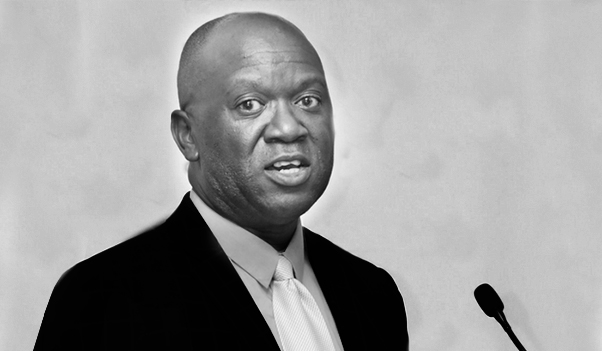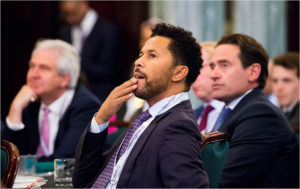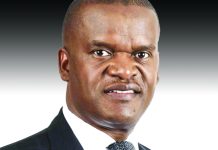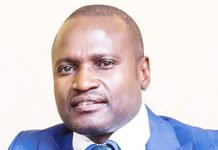
By Shinovene Immanuel and Sakeus Iikela | 30 June 2020
TWO law firms have failed to explain why they fixed what appears to be a N$105 million kickback scheme from the N$7 billion Hosea Kutako International Airport tender that was awarded and cancelled five years ago.
The questionable N$105 million scheme payment linked to a Chinese state-owned company comes five years after The Namibian reported that middleman Knowledge Katti was set to benefit from N$100 million in ‘commission’ from the airport upgrade project.
Court documents now show there was a plan five years ago for N$105 million to be paid to the law firm Tjombe-Elago Incorporated if the airport contract was successfully signed.
The plan emerges from a document filed at the Windhoek High Court in a case in which the law firm Shikongo Law Chambers is suing the Anhui Foreign Economic Construction Group and a subsidiary of Anhui, Sogecoa Investments Namibia, for N$3,1 million in unpaid legal fees the firm says is due to it.
Tjombe-Elago Inc and Shikongo Law Chambers face allegations of concluding an illegal agreement with Anhui, potential conflict of interest and overcharging the Chinese company through legal fees.
The two firms represented Anhui, which won the Hosea Kutako International Airport upgrade contract in December 2015.
President Hage Geingob cancelled the contract that same month, citing irregularities and potential corruption.
Anhui then directed Shikongo Law Chambers to challenge Geingob’s cancellation in the High Court the following year.
Shikongo Law Chambers, which previously represented the Namibia Airports Company, teamed up with Tjombe-Elago Inc – owned by lawyers Norman Tjombe and Petrus Elago – to sue the government on behalf of Anhui.
The Chinese company won in the High Court, but their joy was short-lived. The government appealed against the decision and won the case in the Supreme Court.
Tjombe-Elago Inc invoiced Anhui around N$6,3 million for legal services.
Sources in the legal fraternity branded those figures grossly inflated.
With the Chinese company having not paid the N$6,3 million legal fees in full, Shikongo Law Chambers is suing the company, claiming it still has to be paid its share of the invoice submitted to Anhui.
KICKBACK SCHEME
Shikongo Law Chambers’ decision to sue has brought a contingency agreement signed by Petrus Elago and a representative of Anhui on 11 April 2016 to the surface. The agreement shows how the law firm stood to benefit from the airport deal.
“In consideration of the legal services, the client will pay an amount equivalent to 1,5% of the direct cost of construction of the upgrade of the Hosea Kutako International Airport presently being US$477,8 million [N$7 billion],” the agreement said.
A 1,5% share of N$7 billion would have been around N$105 million. And it was not for legal work done for the court challenge.
“The amount payable is also to exclude any amounts disbursed by the client to the firm during the impending litigation,” the agreement said.
The agreement states the amounts will be paid “directly into any bank account designated by the law firm”.
With Shikongo Law Chambers now suing Anhui, the Chinese company is saying in court documents the contingency agreement was unlawful, as lawyers in Namibia are not allowed to agree to be paid a percentage of the money their clients secure through litigation.

Elago told The Namibian two weeks ago his firm provided legal services to Anhui in the airport cancellation court case.
He claimed the contingency fee was never enforced and the law firm only claimed ordinary fees for services it rendered.
“This was for the litigation in the High Court, which our client instituted, and in the appeal in the Supreme Court, which was instituted by the government,” Elago said.
Elago, however, did not explain why his firm had an agreement to be paid 1,5% or close to N$105 million from the airport tender. He also did not explain what this payment was meant for.
He, however, said “soon after the agreement was signed with the client, we did not proceed on the basis of the contingency fee agreement, but rather on the ordinary fees and disbursements”.
DOUBLE-DIPPING
The resurfacing of the mooted payment of N$105 million comes five years after The Namibian reported that Knowledge Katti was set to benefit from N$100 million in ‘commission’ from the airport upgrade contract.

Sources said at the time some bribes had already been paid.
Shikongo Law Chambers partner Elias Shikongo told The Namibian yesterday he was not part of the agreement that would have resulted in a payment of N$105 million.
“Shikongo Law Chambers had no written agreement and is not covered by the agreement you referred to but rendered similar services jointly with the legal team referred to above and for which legal fees were discussed and agreed,” he said.
However, in its claim in the High Court, Shikongo’s firm says it was verbally agreed that the terms and conditions of the contingency agreement would apply to the firm just like it was to apply to Tjombe-Elago Inc.
Shikongo has in the past acted as Katti’s lawyer.
He yesterday said “our firm was independently approached by Anhui Company as a client and eventually formed part of a legal team comprising two law firms, one local advocate and a South African senior counsel to seek the enforcement of a contract awarded to the company through legal action”.
Shikongo Law Chambers previously represented the Namibia Airports Company (NAC), which was one of the parties sued by Anhui.
In its claim in the High Court, Shikongo’s firm says it “attended to all consultative and court appearances jointly with Tjombe-Elago Inc”, and Anhui was subsequently jointly billed for the firms’ services with an invoice issued by Tjombe-Elago Inc.
Shikongo said he was not conflicted by representing Anhui while he was the NAC’s lawyer in the past.
“No conflict whatsoever as the NAC awarded the contract in question to Anhui Company and thus opted not to oppose the legal action,” he said.
Shikongo also defended the invoice to the Chinese company.
“The legal bill is fully itemised, item by item, and does not allow for inflation, otherwise the client would have availed itself the option of having it taxed,” he said.
Shikongo added that “the fact that legal services were rendered is not at all denied, hence an offer to settle was communicated to us which we unfortunately had to decline”.
He said “the legal team’s involvement and mandate had nothing to do with negotiating or enforcing an inflated contract as such preceded our mandate”.
“Ours was purely a legal mandate like all other legal mandates to ensure compliance with a legal contract already negotiated and agreed upon between two parties themselves until the intervention by the government”.
This is not the first time that Chinese-dominated contracts have been linked to potential kickbacks.
Multibillion-dollar tenders like the airport deal often offer competition among power brokers to push for companies to win the contract in exchange for commissions or kickbacks.






Your article helped me a lot, is there any more related content? Thanks!
pin-up 306: pin-up – pin up casino azerbaycan
http://northern-doctors.org/# buying prescription drugs in mexico
buying prescription drugs in mexico online mexican pharmacy northern doctors buying from online mexican pharmacy
buying prescription drugs in mexico online п»їbest mexican online pharmacies mexican mail order pharmacies
mexican drugstore online: northern doctors – buying from online mexican pharmacy
pharmacies in mexico that ship to usa: п»їbest mexican online pharmacies – mexico drug stores pharmacies
https://northern-doctors.org/# mexico pharmacies prescription drugs
mexico pharmacies prescription drugs: mexican pharmacy – mexican mail order pharmacies
https://northern-doctors.org/# mexico pharmacy
https://northern-doctors.org/# mexican online pharmacies prescription drugs
medicine in mexico pharmacies: mexican northern doctors – pharmacies in mexico that ship to usa
mexico pharmacy: northern doctors pharmacy – medication from mexico pharmacy
mexican drugstore online Mexico pharmacy that ship to usa buying prescription drugs in mexico online
п»їbest mexican online pharmacies mexican pharmacy mexico drug stores pharmacies
http://northern-doctors.org/# mexican pharmacy
mexican border pharmacies shipping to usa: mexican pharmacy online – mexican online pharmacies prescription drugs
mexico drug stores pharmacies: mexican pharmacy – medication from mexico pharmacy
https://northern-doctors.org/# mexican online pharmacies prescription drugs
mexico drug stores pharmacies: mexican pharmacy online – purple pharmacy mexico price list
reputable mexican pharmacies online: northern doctors pharmacy – buying prescription drugs in mexico online
http://northern-doctors.org/# buying prescription drugs in mexico online
https://northern-doctors.org/# mexican mail order pharmacies
mexican border pharmacies shipping to usa: mexican pharmacy northern doctors – mexican rx online
purple pharmacy mexico price list: mexico drug stores pharmacies – mexican pharmaceuticals online
https://northern-doctors.org/# mexican pharmacy
purple pharmacy mexico price list: best online pharmacies in mexico – best online pharmacies in mexico
best online pharmacies in mexico: northern doctors – mexico drug stores pharmacies
mexico drug stores pharmacies mexican pharmacy northern doctors medicine in mexico pharmacies
https://northern-doctors.org/# buying from online mexican pharmacy
п»їbest mexican online pharmacies: mexican pharmacy northern doctors – purple pharmacy mexico price list
reputable mexican pharmacies online: northern doctors – buying from online mexican pharmacy
https://northern-doctors.org/# buying prescription drugs in mexico online
http://northern-doctors.org/# buying from online mexican pharmacy
buying prescription drugs in mexico: mexican pharmacy – medicine in mexico pharmacies
medication from mexico pharmacy: mexican pharmacy – medicine in mexico pharmacies
mexico pharmacies prescription drugs: Mexico pharmacy that ship to usa – best online pharmacies in mexico
http://northern-doctors.org/# reputable mexican pharmacies online
reputable mexican pharmacies online: Mexico pharmacy that ship to usa – buying from online mexican pharmacy
mexico drug stores pharmacies: northern doctors pharmacy – mexican pharmacy
http://northern-doctors.org/# pharmacies in mexico that ship to usa
mexican online pharmacies prescription drugs: mexican northern doctors – buying from online mexican pharmacy
mexico drug stores pharmacies mexican northern doctors best online pharmacies in mexico
mexican drugstore online: northern doctors pharmacy – buying prescription drugs in mexico
https://northern-doctors.org/# mexico drug stores pharmacies
mexican pharmaceuticals online mexican pharmacy online mexico drug stores pharmacies
best online pharmacies in mexico: northern doctors pharmacy – mexican mail order pharmacies
reputable mexican pharmacies online: mexican pharmacy northern doctors – п»їbest mexican online pharmacies
https://northern-doctors.org/# mexico drug stores pharmacies
mexican border pharmacies shipping to usa: northern doctors – mexican pharmacy
mexico pharmacies prescription drugs: mexican pharmacy – mexican pharmacy
mexico pharmacies prescription drugs pharmacies in mexico that ship to usa mexican pharmaceuticals online
https://northern-doctors.org/# п»їbest mexican online pharmacies
http://northern-doctors.org/# purple pharmacy mexico price list
buying prescription drugs in mexico: northern doctors pharmacy – reputable mexican pharmacies online
mexican drugstore online: mexican pharmacy online – mexico pharmacies prescription drugs
https://northern-doctors.org/# mexican mail order pharmacies
mexico pharmacies prescription drugs: northern doctors – mexican drugstore online
http://northern-doctors.org/# mexican pharmacy
mexican pharmacy: mexican northern doctors – mexico drug stores pharmacies
purple pharmacy mexico price list: mexican pharmacy northern doctors – buying prescription drugs in mexico
https://northern-doctors.org/# pharmacies in mexico that ship to usa
https://northern-doctors.org/# best online pharmacies in mexico
п»їbest mexican online pharmacies: purple pharmacy mexico price list – medicine in mexico pharmacies
mexico pharmacies prescription drugs: mexican pharmacy northern doctors – buying from online mexican pharmacy
buying prescription drugs in mexico online: Mexico pharmacy that ship to usa – buying prescription drugs in mexico online
purple pharmacy mexico price list: mexican pharmacy – п»їbest mexican online pharmacies
http://northern-doctors.org/# medicine in mexico pharmacies
buying from online mexican pharmacy mexican pharmacy purple pharmacy mexico price list
https://northern-doctors.org/# mexican mail order pharmacies
mexican pharmaceuticals online mexican pharmacy northern doctors medicine in mexico pharmacies
best online pharmacies in mexico: Mexico pharmacy that ship to usa – best online pharmacies in mexico
mexican pharmacy: mexican pharmacy online – mexico drug stores pharmacies
mexico drug stores pharmacies: mexican pharmacy northern doctors – medication from mexico pharmacy
https://northern-doctors.org/# buying from online mexican pharmacy
best online pharmacies in mexico: mexican northern doctors – mexico pharmacy
buying from online mexican pharmacy: northern doctors – mexico pharmacies prescription drugs
https://northern-doctors.org/# mexico drug stores pharmacies
https://northern-doctors.org/# mexico pharmacy
reputable mexican pharmacies online: mexican pharmacy online – purple pharmacy mexico price list
reputable mexican pharmacies online: Mexico pharmacy that ship to usa – mexican pharmaceuticals online
purple pharmacy mexico price list: mexican pharmacy online – reputable mexican pharmacies online
https://northern-doctors.org/# purple pharmacy mexico price list
https://northern-doctors.org/# mexican rx online
mexican border pharmacies shipping to usa: Mexico pharmacy that ship to usa – buying from online mexican pharmacy
pharmacies in mexico that ship to usa: mexican pharmacy – mexico drug stores pharmacies
https://northern-doctors.org/# buying prescription drugs in mexico
mexican drugstore online: mexican pharmacy online – mexican border pharmacies shipping to usa
purple pharmacy mexico price list: mexican pharmacy northern doctors – medicine in mexico pharmacies
mexican mail order pharmacies: northern doctors – buying from online mexican pharmacy
https://northern-doctors.org/# purple pharmacy mexico price list
https://northern-doctors.org/# mexico drug stores pharmacies
medicine in mexico pharmacies: mexican northern doctors – best online pharmacies in mexico
mexico drug stores pharmacies: mexican pharmacy – mexican border pharmacies shipping to usa
buying from online mexican pharmacy: mexican northern doctors – purple pharmacy mexico price list
mexico pharmacy: mexican pharmacy northern doctors – mexican drugstore online
pharmacies in mexico that ship to usa: mexican pharmacy online – buying prescription drugs in mexico online
mexican mail order pharmacies northern doctors pharmacy buying prescription drugs in mexico online
п»їbest mexican online pharmacies mexican pharmacy mexican online pharmacies prescription drugs
http://northern-doctors.org/# mexico drug stores pharmacies
pharmacies in mexico that ship to usa: mexican pharmacy northern doctors – mexico pharmacies prescription drugs
medicine in mexico pharmacies: mexican pharmacy northern doctors – buying from online mexican pharmacy
mexican pharmaceuticals online: mexican pharmacy online – best online pharmacies in mexico
mexico pharmacies prescription drugs: mexican pharmacy online – medication from mexico pharmacy
http://northern-doctors.org/# mexico drug stores pharmacies
https://northern-doctors.org/# buying prescription drugs in mexico online
п»їbest mexican online pharmacies: reputable mexican pharmacies online – mexican rx online
best online pharmacies in mexico: northern doctors pharmacy – mexican drugstore online
http://northern-doctors.org/# best online pharmacies in mexico
https://northern-doctors.org/# mexican border pharmacies shipping to usa
mexican border pharmacies shipping to usa: mexican pharmacy online – reputable mexican pharmacies online
medication from mexico pharmacy mexico pharmacy medicine in mexico pharmacies
https://cmqpharma.com/# mexico pharmacy
п»їbest mexican online pharmacies
mexican border pharmacies shipping to usa cmq pharma mexican pharmacy mexican pharmacy
reputable mexican pharmacies online mexican online pharmacy pharmacies in mexico that ship to usa
mexican online pharmacies prescription drugs online mexican pharmacy reputable mexican pharmacies online
mexican mail order pharmacies mexico pharmacy mexican drugstore online
pharmacies in mexico that ship to usa: cmq pharma – reputable mexican pharmacies online
mexican border pharmacies shipping to usa mexican online pharmacy mexico pharmacy
п»їbest mexican online pharmacies mexican online pharmacy mexico pharmacies prescription drugs
medicine in mexico pharmacies mexico pharmacy mexican rx online
п»їbest mexican online pharmacies online mexican pharmacy buying prescription drugs in mexico
mexican pharmaceuticals online
https://cmqpharma.com/# mexican mail order pharmacies
purple pharmacy mexico price list
medicine in mexico pharmacies mexican pharmacy mexican pharmacy
mexican mail order pharmacies mexican pharmacy online pharmacies in mexico that ship to usa
medicine in mexico pharmacies cmq pharma mexican pharmacy medicine in mexico pharmacies
mexico drug stores pharmacies mexican online pharmacy mexican pharmaceuticals online
purple pharmacy mexico price list mexico pharmacy medication from mexico pharmacy
mexican mail order pharmacies cmqpharma.com pharmacies in mexico that ship to usa
pharmacies in mexico that ship to usa mexican pharmacy online mexican rx online
mexico pharmacy cmq mexican pharmacy online pharmacies in mexico that ship to usa
mexican mail order pharmacies online mexican pharmacy mexican pharmaceuticals online
mexico pharmacies prescription drugs mexico pharmacy buying prescription drugs in mexico online
http://cmqpharma.com/# medicine in mexico pharmacies
mexican rx online
http://cmqpharma.com/# mexican pharmaceuticals online
mexican rx online
mexico drug stores pharmacies cmq pharma mexican pharmacy
Very interesting topic, thank you for putting up.Raise range
buy prescription drugs from india: indianpharmacy com – reputable indian online pharmacy
reputable indian pharmacies: top 10 online pharmacy in india – online pharmacy india
ordering drugs from canada canadian pharmacy 1 internet online drugstore northwest pharmacy canada
https://canadapharmast.com/# thecanadianpharmacy
mexico pharmacies prescription drugs: medicine in mexico pharmacies – reputable mexican pharmacies online
best online pharmacies in mexico: mexican rx online – medication from mexico pharmacy
ed drugs online from canada ed drugs online from canada canadian pharmacy
https://foruspharma.com/# best online pharmacies in mexico
indian pharmacy paypal: reputable indian online pharmacy – indianpharmacy com
mexico pharmacies prescription drugs: п»їbest mexican online pharmacies – mexican border pharmacies shipping to usa
the canadian drugstore: thecanadianpharmacy – canada ed drugs
mexican online pharmacies prescription drugs mexican mail order pharmacies п»їbest mexican online pharmacies
canadian pharmacy antibiotics: canada drug pharmacy – canadian pharmacy 24 com
п»їlegitimate online pharmacies india: indianpharmacy com – india pharmacy mail order
mexico pharmacies prescription drugs buying prescription drugs in mexico online mexican border pharmacies shipping to usa
https://canadapharmast.online/# canadian pharmacy world reviews
mexico pharmacies prescription drugs: mexico pharmacies prescription drugs – medicine in mexico pharmacies
http://foruspharma.com/# medication from mexico pharmacy
mexican mail order pharmacies: medication from mexico pharmacy – medication from mexico pharmacy
buy prescription drugs from india: indianpharmacy com – top 10 pharmacies in india
india pharmacy buy medicines online in india indian pharmacy
mexican online pharmacies prescription drugs: mexican online pharmacies prescription drugs – mexican rx online
pharmacy website india: pharmacy website india – reputable indian pharmacies
top online pharmacy india: indian pharmacy – indian pharmacy online
mexican drugstore online reputable mexican pharmacies online buying prescription drugs in mexico
https://canadapharmast.online/# best canadian pharmacy online
reputable indian pharmacies: best online pharmacy india – indian pharmacy online
indian pharmacy: india pharmacy mail order – cheapest online pharmacy india
mexican pharmacy: mexico pharmacies prescription drugs – mexican online pharmacies prescription drugs
canadian pharmacy sarasota buying from canadian pharmacies legitimate canadian pharmacy online
https://indiapharmast.com/# indianpharmacy com
canadian family pharmacy: canadian pharmacy king reviews – the canadian pharmacy
buying drugs from canada: canadadrugpharmacy com – onlinepharmaciescanada com
canadian pharmacy service: legit canadian pharmacy online – my canadian pharmacy
https://doxycyclinedelivery.pro/# doxycycline 60 mg
how to get clomid pills: can i buy generic clomid without prescription – order generic clomid without rx
http://clomiddelivery.pro/# where can i get clomid no prescription
paxlovid price: paxlovid pill – paxlovid pharmacy
https://amoxildelivery.pro/# order amoxicillin online no prescription
https://clomiddelivery.pro/# can you get clomid
where to buy generic clomid: can you buy generic clomid online – where buy clomid without a prescription
https://clomiddelivery.pro/# cost generic clomid without insurance
where to buy cheap clomid without prescription: can i get cheap clomid pills – how to buy clomid for sale
https://clomiddelivery.pro/# cost of cheap clomid pills
http://paxloviddelivery.pro/# paxlovid pill
http://ciprodelivery.pro/# ciprofloxacin mail online
paxlovid pharmacy: paxlovid pill – paxlovid generic
antibiotic amoxicillin: how to get amoxicillin – amoxicillin 500 mg cost
https://amoxildelivery.pro/# amoxicillin online canada
http://ciprodelivery.pro/# ciprofloxacin generic price
https://amoxildelivery.pro/# where can i buy amoxicillin over the counter
paxlovid covid: paxlovid india – paxlovid pharmacy
https://doxycyclinedelivery.pro/# doxycycline hyclate 100 mg
doxycycline 100mg capsules cost: doxycycline 300 mg daily – where to buy doxycycline 100mg
http://amoxildelivery.pro/# amoxicillin 500mg capsule
https://clomiddelivery.pro/# can i get generic clomid without prescription
doxycycline 500mg capsules: buy doxycycline south africa – doxycycline cost in india
https://paxloviddelivery.pro/# paxlovid generic
buy generic ciprofloxacin: buy cipro without rx – buy cipro online usa
http://amoxildelivery.pro/# rexall pharmacy amoxicillin 500mg
http://amoxildelivery.pro/# amoxacillian without a percription
where can i buy amoxicillin online: prescription for amoxicillin – amoxicillin 200 mg tablet
http://amoxildelivery.pro/# amoxicillin 500 mg for sale
can you get cheap clomid no prescription: can i get generic clomid without a prescription – cost generic clomid without a prescription
п»їpaxlovid: paxlovid for sale – Paxlovid buy online
how can i get generic clomid without insurance: order cheap clomid without a prescription – where to buy cheap clomid without rx